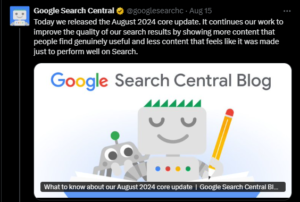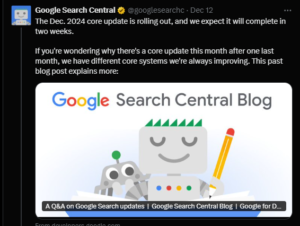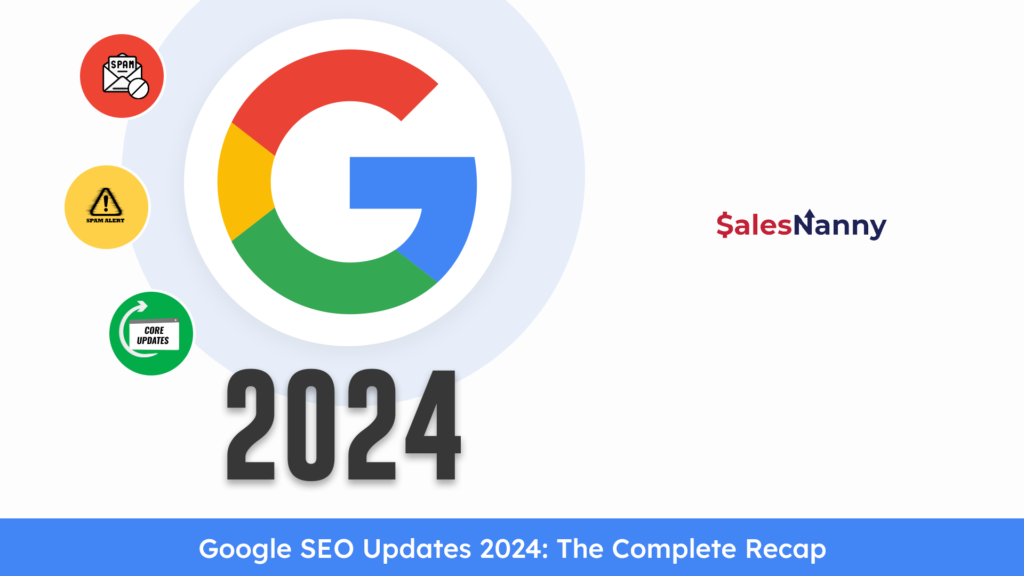Introduction
Search engine optimization (SEO) has become more complex because Google keeps upgrading the algorithms for better user experiences. As it focused on high-quality content, user experience, and fighting spam. Google stressed the importance of accuracy in search results but was simultaneously promoting high-quality, user-centric content. These shifts affected all websites across every industry.
It is important to catch Google’s algorithm changes that companies with organic traffic solely bank on. Every change usually significantly affects search rankings, straight out of the bag connected with visibility, lead production, and revenue generation of the website. Proactive knowledge helps to ensure that your website becomes as competitive as it must in the increasingly cluttered digital space.
Why 2024 Was a Pivotal Year for SEO
Google’s 2024 updates focused on developing emerging technologies like artificial intelligence, which it also tried to address increasing problems related to misinformation and low-quality content. The updates proved Google’s intentions to provide a fair and accurate search environment. In this direction, a new turn towards user experience, accessibility, and meaningful engagement forced websites to meet the set standards.
- Align AI-enhanced content with user intent.
- Optimize Core Web Vitals to meet elevated usability standards.
- Build authenticity and authority to gain user trust.
These updates marked a significant shift, placing adaptability and quality at the forefront of SEO strategies.
Key Updates in Google’s Search Algorithm
January Indexing Issue: A Temporary Disruption
In January, Google faced technical problems that crippled its indexing systems for seven days. This meant that platforms that rely on timely updates, such as news services, could not have updates reflected in the content.
The significance of this disruption lay in the diversified sources of traffic and maintained technical resilience. The solution was momentary, yet it pointed toward the fragile nature of single-channel traffic dependency.
March Core Update: Prioritizing Content Quality
The March core update focused much on the relevance and trustworthiness of online information. Google’s more specific evaluation of E-E-A-T (Experience, Expertise, Authority, Trustworthiness) gave even more weight to first-hand expertise, especially in the YMYL (Your Money or Your Life) topics.
Sites with shallow, low-quality content have been ranking lower, whereas those providing deep and high authority information are ranking higher. This update has reinforced the worth of user-centric, well-researched content.
March Spam Update: Enhancing Search Integrity
In March, a spam update was deployed to curb manipulation techniques such as keyword stuffing and cloaking. Sites that had the practice of such would be rewarded. Sites with such practices lost ranking. That lesson to the webmaster is clear-genuine content quality above manipulation technique.
June Spam Update: Strengthening Anti-Spam Measures
This built on top of the March effort that made advanced algorithms detect and penalize spam-generated low-quality AI-based content. The necessity to use AI responsibly in ways that complement, rather than substitute, human expertise is now even stronger.
August Core Update: Refining Search Intent

August’s core update was more oriented toward aligning search results more closely with user intent. This update diversified the search result content and improved query-to-content match accuracy. For this reason, businesses are advised to include FAQs and structure data to answer users’ questions.
November Core Update: Enhancing Local and Ambiguous Queries

In the November core update, it refined the algorithms to be better at interpreting ambiguous searches and emphasizing local search relevance. Extremely targeted, locally focused content became a big deal in order to hold competitive rankings.
December Core Update: Closing the Year with Precision

The December core update focuses more on content authenticity and the overall performance of the site. Core Web Vitals have been pushed even higher than ever. Less visibility for clickbait and shallow content calls for more authentic, user-oriented value.
December Spam Update: Reinforcing Ethical Standards

This last update of the year also furthered Google’s stand against deceptive practices. Sites that complied received better rankings, while violation penalties became stricter, hence reinforcing the importance of keeping things transparent and genuine.
Lessons Learned from Google’s 2024 SEO Updates
Reflecting on 2024, several clear takeaways emerged for SEO professionals:
- Content Quality is Paramount: Well-researched, user-focused content consistently performed better.
- User Experience Drives Rankings: Fast, mobile-friendly websites that meet Core Web Vitals thresholds remained competitive.
- Ethical SEO is Non-Negotiable: Black-hat tactics faced heavy penalties.
- Monitoring is Crucial: Regular analysis using tools like Google Search Console and third-party platforms is essential to stay ahead.
Adapting to 2024’s SEO Changes
To navigate 2024’s updates, businesses should focus on:
- E-E-A-T Principles: Build authority with expert-authored content and transparent sourcing.
- Core Web Vitals: Enhance site speed, responsiveness, and visual stability to improve user experience.
- Responsible AI Usage: Use AI tools to augment creativity while maintaining authenticity.
- User Intent Alignment: Develop strategies that directly address user needs.
- Traffic Diversification: Reduce reliance on a single channel by expanding into social media, paid ads, and email marketing.
Conclusion
Google’s 2024 SEO updates highlighted user-first strategies, ethical practices, and technical excellence. Businesses that followed these principles were rewarded with better rankings and increased online presence. The lessons learned in 2024 will shape effective SEO strategies for 2025.
With information, proactivity, and responsiveness, businesses will thrive well in the ever-changing landscape of the digital world. Success depends on understanding all these updates and applying strategies in line with quality, relevance, and user satisfaction.





